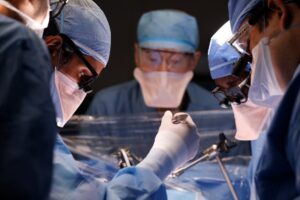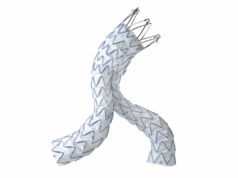
Ismail El-Hamamsy, director of aortic surgery for the Mount Sinai Health System (New York, USA), was named as the new president of the Heart Valve Society (HVS) at the organisation’s 2024 annual meeting (18–21 February, Boston, USA). He becomes the 11th president of HVS.
In his year-long term as President of HVS, El-Hamamsy will focus on fostering collaboration among cardiologists, surgeons, and researchers, as well as promoting awareness and encouraging innovation to reduce the burden of heart valve disease globally.
He previously served on the HVS board of directors and has led the HVS AVIATOR Registry, an international registry examining outcomes after aortic valve surgery. At this year’s meeting, he led several sessions focusing on aortic valve/root replacement in young adults and delivered a keynote lecture on the renaissance of the Ross procedure for aortic valve reconstruction.
“I am very excited and honoured to lead the Heart Valve Society and further consolidate its role as a unique society dedicated to valvular heart disease. In the year to come, I aim to further advance awareness about the global burden of valve disease, as well as promote collaborative research initiatives between scientists and clinicians. Furthermore, I hope to leverage the Heart Valve Society as a great educational platform for cardiologists and surgeons, in order to advance best practices for patients worldwide,” says El-Hamamsy.
These strategies closely align with El-Hamamsy’s work in studying outcomes of the Ross procedure, disseminating the data, and teaching surgeons around the world to perform this operation safely and effectively. “Over the past decade, there has been a global rise in Ross procedures, as new studies have continued to reveal superior long-term outcomes as compared to patients who received biological or mechanical aortic valve replacements,” he says.
El-Hamamsy led a team of Mount Sinai cardiovascular surgeons to perform more than 100 successful Ross procedures in 2023—the first time any surgical program in the world has achieved this milestone in a single year. This specialised and complex procedure is the optimal treatment for replacing a diseased aortic valve in adolescents and adults with the patient’s own living pulmonary valve—a mirror image of a normal aortic valve—resulting in improved long-term life expectancy, unlike mechanical or tissue valve replacements. The Ross procedure also requires less reliance on blood thinners and reduces the chances of requiring another surgery or valve intervention.
“The Ross Procedure is all the more life-changing for women who are contemplating future pregnancies, and for patients who lead active lifestyles,” said El-Hamamsy.
El-Hamamsy has published numerous studies examining the role of different aortic valve replacement procedures on long term outcomes of patients. A recent study published in the Journal of American College of Cardiology (JACC) was the first to compare the Ross procedure to the mechanical and biological valve replacement, showing improved survival and better outcomes in adults.
In addition, his more recent study in JAMA Cardiology showed a survival benefit following the Ross procedure of up to 26 years. The study was the first to demonstrate benefits more than two decades after the operation.










